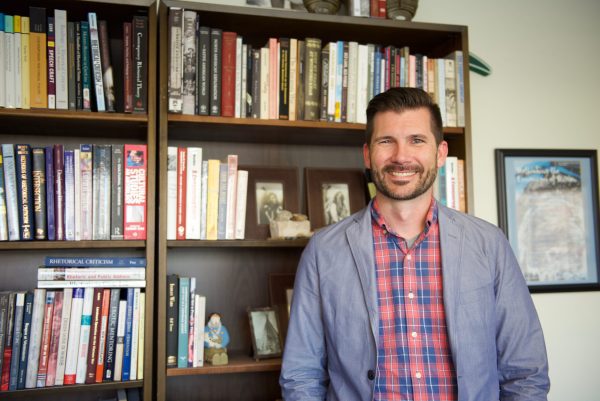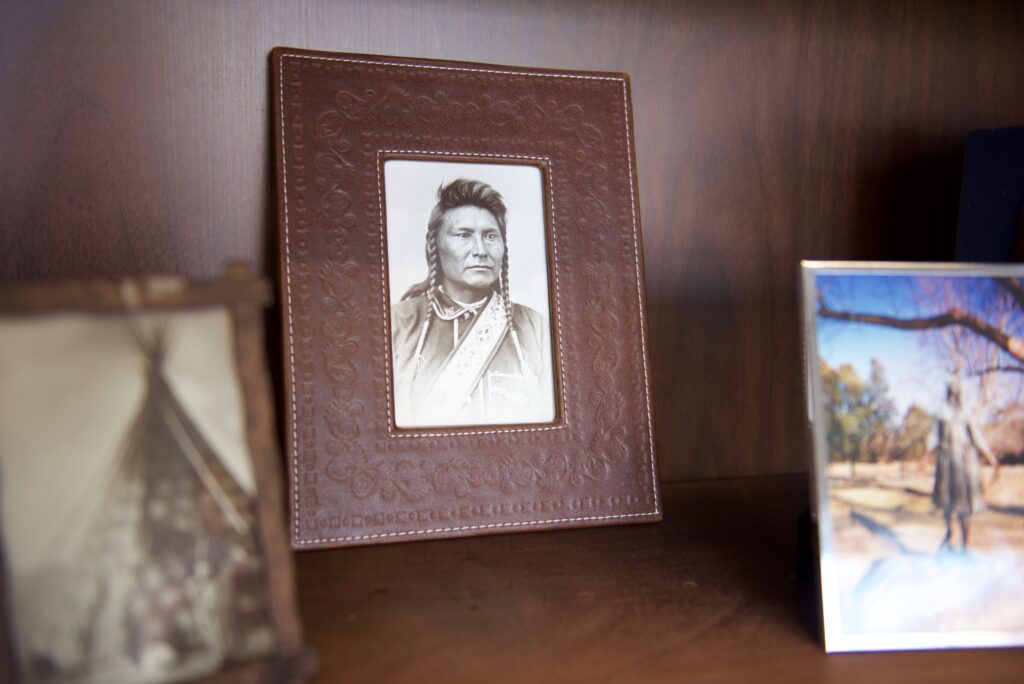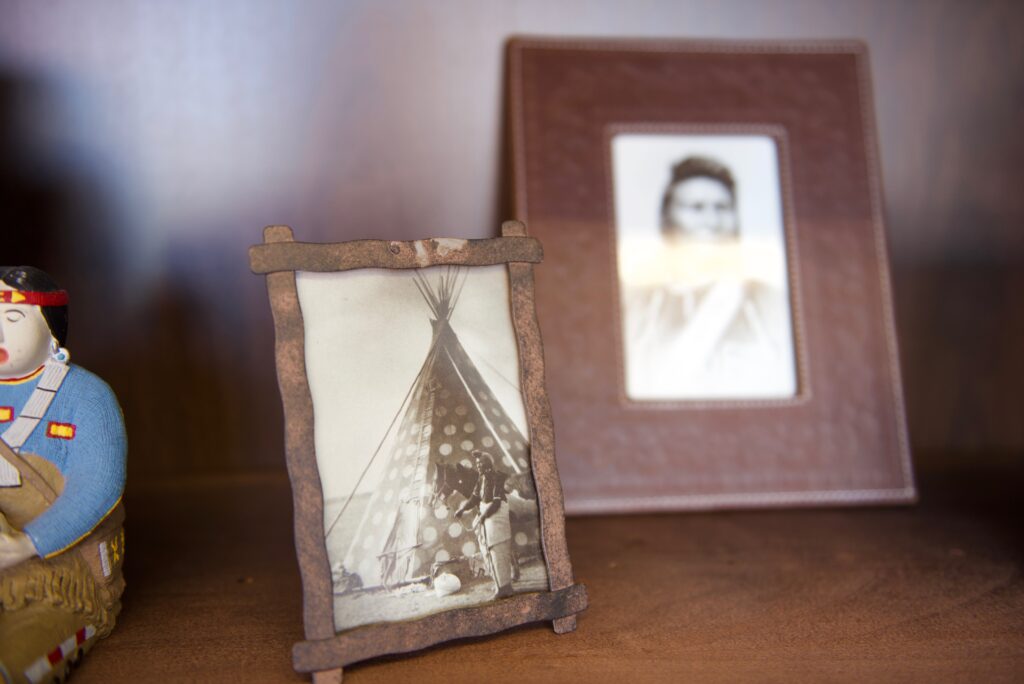With Fulbright Support, Jason Black Researches Indigenous Mascotting Issues

Jason Black, chair of the Department of Communication Studies, in early 2020 received a Fulbright award in support of a cross-cultural study of the indigenous mascotting controversy in Canadian and U.S. cultures of sport.
Black was based at Brock University in St. Catharines, Ontario as the Centre for Canadian Studies’ Fulbright Research Chair in Transnational Studies. Just over two months into his four-month appointment, the COVID-19 pandemic cut his trip short.
Since returning to Charlotte, he has continued his research from afar, working on his second book on mascotting, titled Mascotting Indigenous Canada: Colonial and Decolonial Representations in Sport Culture (contracted with University of Toronto Press). An earlier book, Mascot Nation: The Controversy over Native American Representations in Sports, is a multi-dimensional study with co-author Andrew C. Billings that digs into the textual, visual, and ritualistic and performative aspects of sports mascots.
While at Brock, Black taught a “Social Activism and Culture in Canada and the United States” course focused on primary sources – manifestos, films, songs, poems, and symbolic expressions – that come from people who were activists in particular contexts.
Here are some of Black’s thoughts about his Fulbright experience and his research. The original story can be found in the Department of Communication Studies’ Ezine here: communication.uncc.edu.
Favorite Things
“I enjoyed being immersed in Canadian culture and meeting scholars, students, public stakeholders and – most vitally – Indigenous activists and advocates as a part of my research and teaching in social change. The great thing about Fulbright is that it places one’s mind and body in a physical space with others; it’s a part of research and teaching that simply can’t be replicated digitally, virtually or across time and space.
Being together allows for a great deal of sharing, not just academic ideas, but one’s own truth. And, one’s own narrative is vital when working in circles of social change, particularly with Indigenous communities. Writing ‘at home’ or teaching at one’s home institution or in one’s own country does not afford the same type of intellectual and emotional exchange.


My research project is called Mascotting Indigenous Canada, which is also the title of my contracted book. The book examines mascotting culture, both pro-mascotting rhetoric and anti-mascotting resistance, through colonial and decolonial lenses, respectively.
The book is broken into three chapters – a case on the Edmonton Eskimos Canadian Football League franchise, a case on the successful retirement of the McGill University (Montreal) Redmen name, and cases on local Ontario campaigns to retire the names and logos of municipal and minor league sports teams.
What’s been great is interviewing the activists themselves that are a part of these cases and working together to discover solutions for decolonizing mascot culture and collaborating on ways to improve respect for Indigenous people – First Nations, Metis, and Inuit – and material conditions for these communities. Again, just being around people in a host country whose culture one is studying is the best part of Fulbright. I love the ambassadorial part of the experience.
Pandemic Pressures
The pandemic hasn’t changed the ends or anticipated ‘products’ of my research plans, but it has certainly forced me to recalibrate the way I’m moving toward my research goals.
I made it through just over half of my Fulbright visit before having to leave on March 18.
Unfortunately, the months of March and April were packed full of travel and interviews with folks whose truths and stories are central to my work on Indigenous mascots in Canada.
These interviews and these conversations are continuing; given social distancing – and now physical distance – I am speaking with folks over the phone and via Skype. and I’m in touch in terms of written responses to questions and that sort of thing. So, again, the ends of the research will remain on target.
But, the means are where fulsome scholarship and sound community-making reside. And, I fear that’s where my research plans will suffer a bit.
First, a Fulbright is about immersive experiences. My research could be done without such an experience from right here in North Carolina, but a Fulbright assignment allows one to move beyond being merely present and more toward working with presence.
Being Present
Not being at Brock University and in Canada through the end of my Fulbright meant that I didn’t have my body in space and my voice in physical proximity to scholars, community members and my students, although I did still teach my Social Activism course online.
Even in an age of digital communication and electronic diffusion of information, it’s the ‘face-to-face’ aspect of Fulbright that enriches a research endeavor because it adds temporal and social dimensions. Fulbrighters get to share time and space with a host community.
Second, having conversations with Indigenous communities is enriched through direct conversations where truths can be shared – not in a westernized, modernist question and answer format – but where stories can be joined and understood to mean together through the many throughways that a conversation takes. We can learn a great deal from each other through deductive question and answer, but it’s the inductive beauty of a conversation ‘web’ that allows people’s truths to pulsate and shine.
There are also respect, faith and trust factors that converge in contexts about Indigenous experiences and lifeways, particularly when it comes to scholars entering the conversation. Not having face-to-face conversations – not across a table, but around a space – will hinder the means to the ends regarding the mascot book.
All of this to say that for all the heartbreak, shock and trauma that the pandemic has caused concerning this Fulbright assignment, which is a task that takes three years to plan, there are some wonderful things still to come. And, I cannot forget that the time at Brock has been life-changing.
Interview: Haley Hartsell with Jason Black | Images: Lynn Roberson